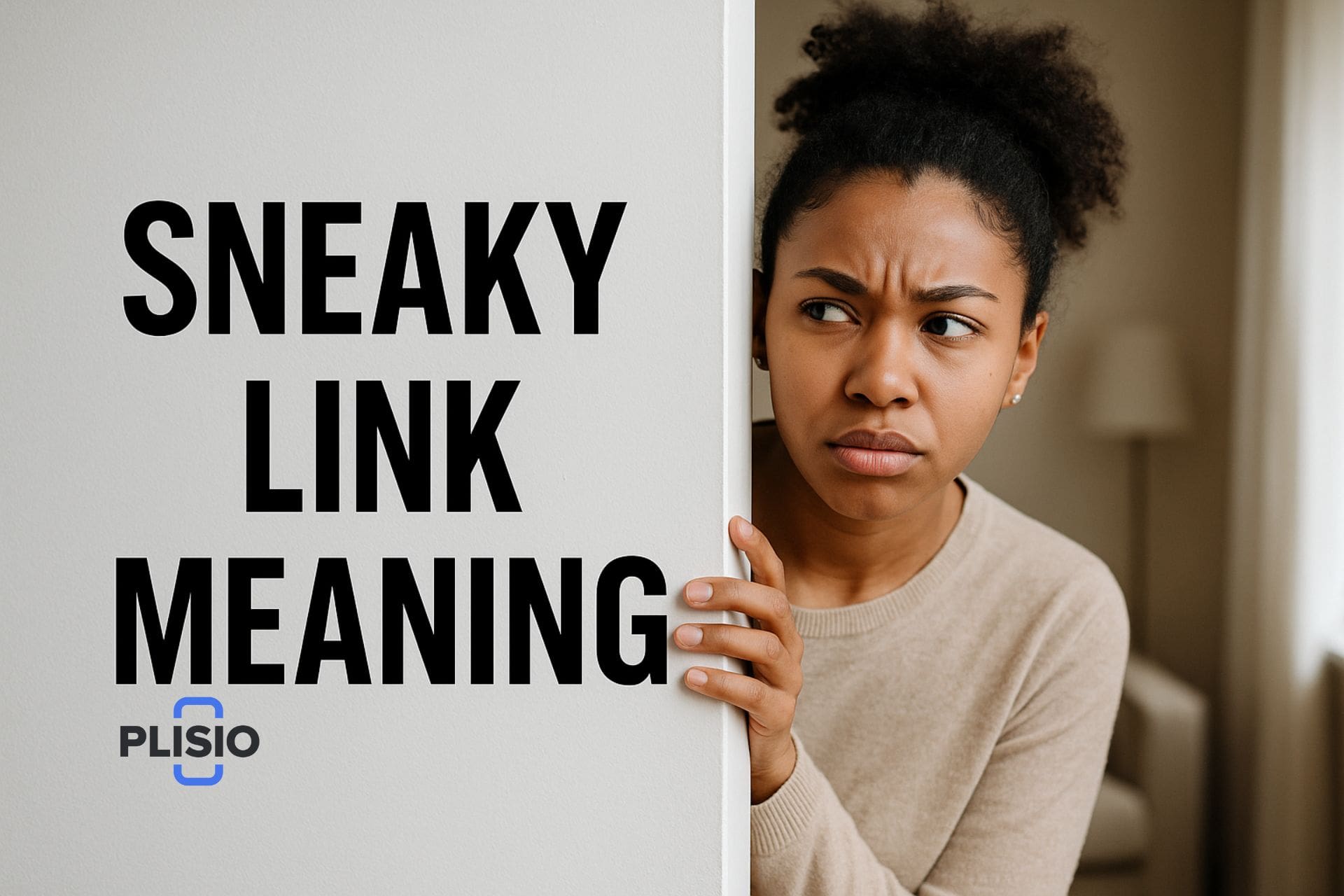Sneaky Link Meaning, Uses and Examples

In today’s fast-moving digital world—where social media platforms like TikTok, Twitter, Instagram, and Snapchat dominate—new slang emerges daily. One standout is sneaky link: a slang term used to describe someone that someone is secretly hooking up with. As of 2025, hashtags like #sneakylink have accumulated more than 4.7 billion views on TikTok, underscoring its cultural reach. Whether shared in a meme, a viral song, or a flirty WhatsApp exchange, this phrase is now firmly embedded in the lexicon of young adults. Simply put—a sneaky link is a romantic or sexual date kept under wraps, intentionally hidden from public view. This article explores sneaky links, their dynamics, and what they reveal about digital-age relationships.
Sneaky Link vs Friends-With-Benefits (FWB): Understanding the Distinctions
Although both involve casual interaction, sneaky links are generally more secretive than friends-with-benefits (FWB) relationships. While FWB dynamics often develop from friendships and may be openly acknowledged in a user’s social circle, sneaky links are usually kept hidden from public view. As relationship expert Tanner explains, the key distinction is discretion—sneaky links thrive on secrecy and digital anonymity, sometimes never leaving the confines of Snapchat or WhatsApp. Unlike FWBs, which may evolve into committed relationships, sneaky links rarely do.
Why People Keep Sneaky Links a Secret: Digital Age Motivations
According to Gigi Engle, a certified relationship therapist, people keep sneaky links under wraps for various reasons—often involving social pressure, timing, or concern over judgment. For example, someone might avoid revealing a fling with a co-worker to prevent gossip in a professional setting. Others use this secretive relationship model to reconnect with an ex or engage in a hookup while still in a committed relationship.
In some cases, this type of covert relationship may involve cheating. However, Dr. Emily Morse, a Doctor of Human Sexuality, emphasizes that not all sneaky links are infidelities. Sometimes they’re simply exploratory phases where both parties want to keep things discreet until intentions become clear.
Dr. Jess Carbino, former sociologist for Tinder and Bumble, notes, "The rise of sneaky links reflects a shift in how digital natives view relationships—less emphasis on labels and more on private, short-term interactions."
Mental Health Impacts: How Sneaky Links Affect Self-Esteem
The thrill of secrecy can quickly become emotionally exhausting. Secretive relationships—especially when one partner wants commitment and the other does not—can cause anxiety and reduce self-worth. According to Tanner, hiding a major part of your life can create a sense of isolation. If the link contradicts your values, it may harm your mental well-being.
Dr. Morse adds that discretion can be healthy during early romantic exploration. It’s okay to keep your dating life private initially—particularly when using apps like Tinder or platforms like TikTok to meet new people. The important thing is whether that secrecy empowers you or makes you feel hidden.
Psychologist Dr. Ramani Durvasula warns, "When secrecy becomes habitual rather than situational, it can erode self-esteem and foster feelings of shame."
Meme & TikTok Demographics (2025)
- TikTok reached 1.6 billion monthly users in 2025—up from 1 billion in 2023.
- In the U.S., 120.5 million adults (~50.6%) use TikTok; 59% of people aged 18–29 are active users.
- 55% of TikTok users are under age 30; approximately 56% are male.
- Users in the U.S. average 78.4 minutes/day on TikTok—the highest among social apps.
- 16,000 videos are uploaded per minute—totaling over 23 million daily.
These figures highlight TikTok’s immense influence on modern slang, including terms like "sneaky link."
Sneaky Link by the Numbers: Relationship Transparency Stats
- Roughly 3–7% of U.S. adults engage in consensual non-monogamous arrangements—including sneaky links.
- 62% of partnered adults in the U.S. admit to keeping financial or relationship info secret; 40% hide money from their partners.
These stats show that secrecy in relationships—whether financial or romantic—is common in 2025.
Top Clues You Might Be Someone’s Sneaky Link
Engle outlines behaviors that might describe a person that someone is secretly dating:
- They only invite you over late at night or when no one else is around.
- All interactions happen via social media apps like Instagram, TikTok, or text messages.
- You’ve never met their friends.
- They avoid discussing their personal life.
- You’ve never been on a public date.
- They appear to have another romantic partner.
If these signs sound familiar, it might be time to re-evaluate the relationship context.
When Secrecy Becomes a Problem: What to Do If You Disagree
When one partner wants to keep things under wraps and the other doesn’t, open communication becomes crucial. Ask why the secrecy is important and whether it serves a healthy purpose. If no compromise can be reached, the partners may be seeking different relationship goals.
Dr. Alexandra Solomon, a licensed clinical psychologist and author of Loving Bravely, states, "Open dialogue is essential when navigating boundaries. If secrecy becomes a power imbalance, that’s a red flag."
Should You Engage in a Sneaky Link?
Before becoming involved in a sneaky link, consider whether it aligns with your emotional needs. Some people enjoy the thrill of secrecy and casual freedom, while others may find it diminishes their self-worth over time. If your goal is a committed relationship, sneaky links may not be the best path. However, if both parties are clear and honest about expectations, the dynamic can be enjoyable and mutually beneficial.
Pros and Cons of Sneaky Links: Digital Era Edition
Pros:
- Excitement: There’s a playful thrill in sneaking around that many find exhilarating.
- Avoiding Judgment: Keeping things private on social media helps dodge unwanted opinions.
Cons:
- Emotional Ambiguity: Feelings can get complicated fast if expectations aren’t aligned.
- Mental Health Risks: A study published in the Personality and Social Psychology Bulletin found that concealing relationships can lead to anxiety, low self-esteem, and even physical side effects. Concealment can also jeopardize emotional balance, especially if feelings develop unexpectedly.
To make sneaky links work in a healthy digital context, both users must clearly define the relationship and communicate expectations early on.
Using the Slang 'Sneaky Link': Everyday Examples
Want to know how this slang term appears in real conversation? Here are some typical uses:
- Flirty Text: "I could be your sneaky link ;)"
- Chatting With Friends: "That guy? He’s just my sneaky link."
- Describing a Lover: "They’re clearly into each other—but it’s definitely a sneaky link situation."
- Making Plans: "You free to link tonight?"
- Joking on Social Media: "She’s not my girl, just my link."
Parent Concerns: Monitoring Sneaky Links in Teen Life
As this term becomes increasingly common among teenagers, especially across social media platforms like TikTok and Snapchat, parents might wonder what it means if they catch their child using it. While many sneaky links are playful or harmless, others can reflect more serious relationship dynamics.
Parental control apps, such as AirDroid, allow for healthy digital oversight. These tools can monitor keywords, track app usage, and offer insights without breaching privacy. Having open conversations and educating teens on the risks of secretive relationships promotes safer digital habits.
Final Thoughts: Making Informed Choices About Sneaky Links
In the world of modern slang and online interaction, sneaky links represent a type of romantic or sexual encounter that blends the thrill of secrecy with potential emotional complexity. Whether it’s through a Tinder hookup, a Snapchat habit, or a casual text on WhatsApp, these discreet meet-ups offer excitement—but not always emotional satisfaction.
The key takeaway? Know your boundaries. If you want to keep things private while exploring something casual, that’s okay. But if you’re looking for a primary partner or committed relationship, make sure your intentions—and your partner’s—align. Use this term wisely, and always prioritize honesty, self-awareness, and mutual respect in any connection, whether public or private.

